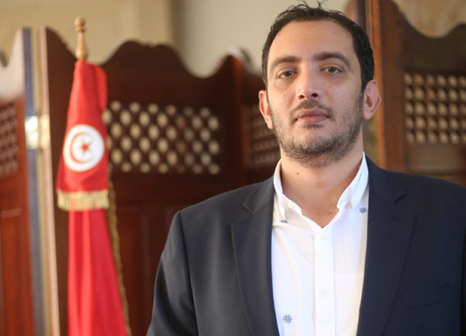Tunisia: Parliamentarian convicted by military court

Yassine Ayari, a 40- year-old engineer who opposed ex-President Ben Ali’s rule, was elected member of Parliament in the 2018 partial elections, and then won a seat for his political movement Hope and Work representing Tunisians in France in the 2019 legislative elections.
On 30 July, at least 30 police officers in civilian clothes raided Yassine Ayari's home without showing an arrest warrant and took him to an unknown destination. His brother told Amnesty International that the family later learned that he had been arrested to serve a two-month sentence pronounced three years earlier on 26 June 2018 by the Tunis military court that had never been implemented due to his immunity as a member of parliament. The military court had sentenced him for a Facebook post considered defamatory of the army. In one of his posts, which warranted the new military prosecution following the 25 July presidential announcement suspending the parliament, he wrote that he would "prefer 1000 times to live in an imperfect democracy, rather than one day under the rule of [Roman Emperor] Nero." The military court ordered his arrest after the lifting of immunity of all members of parliament, ordered by President Saied on 25 July, at the same time as the suspension of parliament.
On 24 August, Yassine Ayari's lawyers filed a request for a release on parole, which the military court refused, without providing any justification.
Article 91 of the Code of Military Justice punishes with up to three years in prison anyone who “commits ... outrages against the flag or the army, offenses against the dignity, reputation or morale of the army, or acts to undermine military discipline, obedience and the respect due to superiors, or who criticizes the action of military hierarchy or the military officers, offending their dignity." At least six other parliamentarians are currently facing trial before the military court for an incident on 15 March 2021 at the airport of Tunis where they had an altercation with security officials who had implemented an arbitrary travel ban on a woman, under a procedure known as ‘S17’. The woman’s lawyer was arrested on 2 September by order of the military court and is held in pre-trial detention in the Mornaguia prison for charges of defaming the army.
Prosecutions for defaming the army or other state institutions are incompatible with Tunisia’s obligations under Article 19 of the International Covenant on Civil and Political Rights (ICCPR). In 2011, the United Nations Human Rights Committee, which monitors implementation of the covenant, issued guidance to states parties on their free speech obligations under Article 19 that emphasized the high value that the ICCPR places upon uninhibited expression “in circumstances of public debate concerning public figures in the political domain and public institutions,” adding that, “State parties should not prohibit criticism of institutions, such as the army or the administration."
Allowing the prosecution of a civilian before a military tribunal is a violation of the right to a fair trial and due process guarantees. The Resolution on the Right to a Fair Trial and Legal Aid in Africa noted that “[t]he purpose of Military Courts is to determining offenses of a pure military nature committed by pure military personnel."
Military courts comprised a key element in the repressive apparatus of the state under the presidencies of Habib Bourguiba, 1957-1987, and Zine El Abidine Ben Ali, 1987-2011. Under both presidents, persons were convicted in blatantly unfair trials before military courts for political crimes. While they underwent a partial reform following Tunisia's uprising, military courts are still under the undue control of the executive branch as the President of the republic has exclusive control over the appointment of judges and prosecutors in these courts.